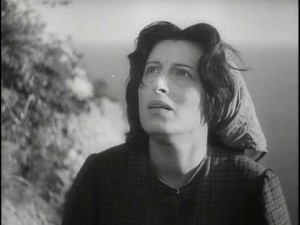The concluding chapter of my book Movie Wars: How Hollywood and the Media Limit What Films We Can See (Chicago: A Cappella Books, 2000). Due to the length of this Conclusion, it’s being posted in two parts. — J.R.
Q: In Chapter Five, you argue that the cable channel Turner Classic Movies does a more responsible job of preserving our film heritage than the American Film Institute, citing what they’ve recently done in “restorations, revivals, documentaries about film history, and even in presenting foreign-language movies.” Of course TCM has vastly more economic and material resources at its disposal than the AFI does, which suggests that big business versus state funding isn’t always the enemy.
A: Yes, and I’d stand by that comparison — although I wouldn’t go so far as to claim that TCM has any sort of edge over the Cinémathèque Française, especially when it comes to varied and knowledgeable programming of world cinema (which includes certain categories like experimental film that TCM completely ignores). I had to wait for years in Chicago before I could get TCM, and friends of mine in New York and Los Angeles had comparable problems. Now that we have it, it’s certainly a boon to get the sort of balance between structured and unstructured programming of older films that the Cinémathèque has often specialized in. Read more
Commissioned by BFI Video for an April 2015 release. — J.R.


L’amore: Due storie d’amore (Love: Two Love Stories, 1947-1948), as it was originally known, is the first feature of Roberto Rossellini to have been completed after his celebrated war trilogy of Rome Open City (1945), Paisà (1946), and Germany Year Zero (1947), although in fact its first episode, A Human Voice (a one-act play by Jean Cocteau), was shot just before Germany Year Zero, and its second, The Miracle, was shot afterwards. A sort of two-part concerto-showcase for Anna Magnani, designed as a single feature, it was originally released outside in Italy only in truncated form due to a failure to clear the rights for the Cocteau play. Gavin Lambert noted in his review of the second film for Monthly Film Bulletin in 1950, ‘Although The Miracle is strong enough to stand on its own, and can fairly be judged as a film in itself, the fact that it is now shown partially out of context has meant some shifting of emphasis: it appears as an isolated tour de force, whereas if it had followed La Voix Humaine, the dedicatory tribute would have been reinforced, the spotlight focused even more sharply on Magnani.’ Read more
The concluding chapter of my book Movie Wars: How Hollywood and the Media Limit What Films We Can See (Chicago: A Cappella Books, 2000).
Due to the length of this Conclusion, it’s being posted in two parts. — J.R.
Conclusion: The Audience Is Sometimes Right
“What is your feeling towards your audiences — towards the public?”
“Which public? There are as many publics as there are personalities.”
— Gilbert Burgess, “A Talk with Mr. Oscar Wilde” (1895)
QUESTION: Aren’t you laying yourself open throughout this book to the charge of sour grapes?
ANSWER: What do you mean?
Q: I mean attacking critics like Janet Maslin and David Denby because you’d so obviously like to have their jobs yourself.
A: If that’s really your impression of what lies behind my arguments, then my arguments have failed. There’s a hefty price tag for whatever prestige and power comes with writing for The New York Times and The New Yorker, and I consider myself fortunate that I don’t have to worry about paying it. Film critics for those publications — including Vincent Canby and Pauline Kael as well as Maslin and Denby — ultimately wind up less powerful than the institutions they write for, and insofar as they’re empowered by those institutions, they’re disempowered as independent voices. Read more


